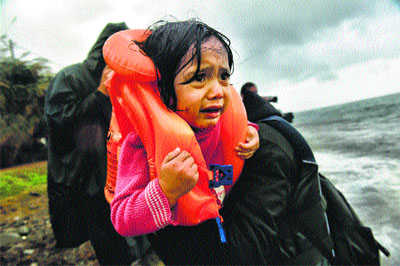
Children and other underprivileged must not become political footballs
Shelley Walia
Little Aylan’s fate was doomed the moment he was shoved atop a 15-foot dinghy to undertake a perilous journey over the rough seas from Turkey to Greece. Like hundreds of thousands of desperate refugees from a war-torn Middle East and North Africa, his Syrian father grew completely despondent at the prospect of his future as a Kurd, living in constant danger since 2011, first in Damascus and then in Kobani. Pitted between the pro-Assad military, the anti-Assad rebels and the new fast-emerging threat of the ISIS, he saw no choice but to trust his future in the hands of unscrupulous smugglers promising a safe passage to Greece. Three-year-old Aylan didn't stand a chance. He and his brother Ghalib drowned shortly along with their mother. Very soon his fragile little body was washed ashore. Face down, still in his shorts and shirt, his picture seared the collective conscience of the world, jolting it into a scathing recognition of the sheer scope and toll of the humanitarian refugee crisis.
It took the death of the most vulnerable to make us sit up and take notice. Churned by a brutal civil war since 2011, Syria's fate has been sealed. In this flammable mix, the arrival of the young militant ISIS jihadists, striving to decimate the country and establish a Caliphate of Islamist purism, is disastrous. To start with, the local Syrian population stayed entrenched in their homes, believing the war would end soon, that the West would surely intervene, or that Assad might be coerced to step down to bring about a fragile but workable calm.
But that did not happen. The war would become more intense impelling mass exodus of the local population. The sea of humanity first moved towards Turkey and Lebanon, then Jordan, but when these countries raised the red flag to becoming tent cities, the migrants began to swarm towards Europe.
Exiles have always been on the move across space through history: Jews, Gypsies, Moors, Turks, Syrians, slaves, and indentured and domestic labour. As one of the descendants of the Auschwitz survivors writes: “World history and personal history collide. This my parents had warned me about when they taught me to always keep my bags packed.” The refugee (from the Latin word fugere) is the one who “reflees”: first being forced to depart from one's homeland as a captive slave, and then having to escape from one's captor in favor of the refugium (asulon, asylum). In the 21st century, it is challenging to conceive of a boundary-ridden world in which one can restrain immigration. Today nearly 1.1 crore Syrians have been displaced. People weary of war and strife in Libya, Somalia, Ethiopia, Iraq and Afghanistan have also joined this historic migration of unprecedented proportions. This year, the number of people fleeing war-torn countries would cross six crore, according to the United Nations.
The European countries are straining at the seams because the cost of keeping refugees is catastrophic both in socio-political and financial terms. The reluctance of Western nations to accommodate any further inflow is a sign of the burden the resettlement of these refugees places on their economies as much as it is an exhibition of reactionary sentiment among the territorially conscious, indicating a sense of neo-conservative chauvinism and racial intolerance. Their “reformist” and “liberal” notions of seeking the inclusion of, and of granting rights to undocumented persons stands questioned.
Clearly, refugees would rather go home, if the possibility of decent survival had not been destroyed. Bolting from the wreckage of the genocidal assault of war-torn nations, they have entered an age of uncertainty, an alarm of the unknown, a fear of strangers and of adjustment that is gnawing at the trust and interdependence on which civil society rests. Behind their odysseys lie a variety of anxieties and apprehensions, such as those of space and cultural habits that are lost, giving rise to struggle for right to reside and right to migrate. Resistance and adaptation, therefore, become the inherent problematic of the migrancy conundrum. With the continuous erosion of the nation-state based territorial sovereignty, tensions of cultural assimilation arise out of the dichotomy of relief and regret, of some composure at the idea of adjustment as opposed to overwhelming pain at the loss of age-old ties with one's native land. Turks residing in Germany, for example, consider themselves to be loyal Germans, but regard their Turkish inheritance no less significant than that of the Germans. Understandably, the dominant national culture cannot be identified with state citizenship, which would cause dangerous social and political upheavals. Although the Schengen agreement allows free movement across borders, resulting in a healthy transcultural environment of coexistence and diversity in customs and traditions, jingoism still prevails, especially towards people from non-European nations.
Currently, the number of people in Syria requiring assistance is more than the combined toll of Hurricane Katrina, the Haiti earthquake and the 2004 Tsunami. A crisis of extraordinary dimension, it requires unparalleled humanitarian outreach. The responsibility is that of the global citizen to rally around those most vulnerable in our midst, and to give them a fighting chance at a better life. Certainly, there will be some danger in that accommodation since radical Islamists will infiltrate; incidents of terrorism in Paris and more recently in California are a result of sheltering migrants. But that does not mean that the West should refuse to accommodate the productive, hardworking people who risk everything to become integral to other cultures. Borders cannot be frozen out of disproportionate fear and xenophobic paranoia..
It is, no doubt, a huge international challenge to accommodate, integrate and employ these migrants in their new countries of residence with the strain it puts on the locals and their economy. Notwithstanding, it is also the time to reject and condemn the rhetoric of the Republican candidates in the US. There is no perfect answer; some countries will do more because they can while others with more fragile economies won't. It is not a matter of equitability. It is a matter of life and death. We should make sure that Aylan Kurdi and thousands of other underprivileged, who have perished in search of a better means of survival, do not die in vain. We, as the human race, owe them that service. This could be our New Year's resolution.
The writer is a Professor of English at Panjab University, Chandigarh



























